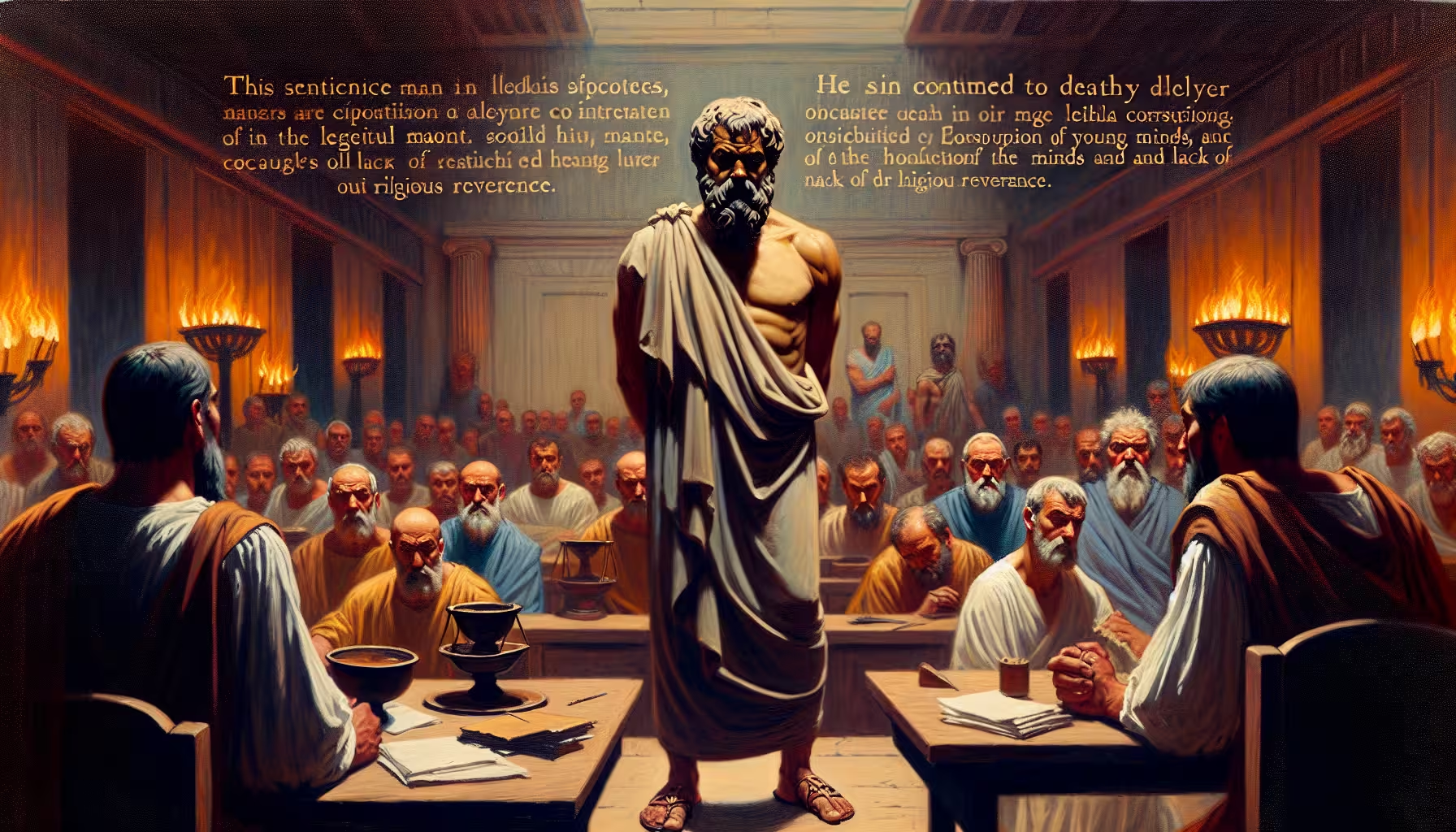
Socrates was an ancient Greek philosopher and one of the most influential figures in Western philosophy. He is renowned for his method of questioning and critical thinking, which became known as the Socratic method. Socrates’ trial and subsequent execution by drinking hemlock in 399 BC epitomize his commitment to his beliefs and his refusal to compromise his principles. His willingness to die for his ideas and his unwavering pursuit of truth have solidified his status as a legendary figure in the history of philosophy. Hook: The trial and death of Socrates reveal the profound impact of his revolutionary ideas and his unwavering commitment to his principles, making
Introduction
In 399 BC, in the ancient city of Athens, a pivotal moment in history unfolded as the renowned philosopher Socrates stood trial on charges of corrupting the youth and impiety. Socrates, a figure of immense intellectual prowess and moral integrity, had spent his life challenging conventional wisdom and questioning the beliefs of his fellow citizens. His unyielding pursuit of truth and virtue had gained him a devoted following among the youth of Athens, but had also stirred the resentment of those in positions of power. Socrates’ trial and subsequent sentencing to death by drinking hemlock is a moment that has echoed through the annals of history, not only for its impact on the life of the philosopher himself, but for the lasting implications it held for the development of philosophy, the relationship between individual thought and societal norms, and the very nature of justice and the rule of law. As the trial of Socrates unfolds, the reader is drawn into a dramatic narrative that delves into the clash between intellectual freedom and the constraints of a society seeking control and conformity. The trial becomes a turning point in the life of Socrates, forcing him to defend his ideals, confront his accusers, and ultimately face the ultimate sacrifice for his unwavering commitment to the pursuit of truth and virtue. This
Socrates was tried and sentenced to death by drinking hemlock in 399 BC for corrupting the youth and impiety.
“The Fall of a Philosopher: Socrates’ Trial and Execution for Alleged Corruption and Impiety”
The Fall of a Philosopher: Socrates’ Trial and Execution for Alleged Corruption and Impiety Socrates, a renowned philosopher in ancient Athens, found himself on trial for alleged corruption and impiety. Despite his reputation for wisdom and moral integrity, he was accused of corrupting the youth of Athens by encouraging them to question authority and traditional beliefs. In addition, he was charged with impiety for not recognizing the city’s gods and introducing new deities. During the trial, Socrates passionately defended himself, arguing that he was simply a seeker of truth and virtue. However, the jury ultimately found him guilty and sentenced him to death by drinking hemlock. This marked the end of an era for Socrates and his philosophical teachings, as his legacy continued to influence future generations of thinkers and scholars.
“Socrates: The Trial and Tragic End of a Philosopher”
Socrates: The Trial and Tragic End of a Philosopher The trial of Socrates was a momentous event in the history of philosophy. Accused of corrupting the youth and impiety, Socrates stood before the court and defended himself with his signature eloquence and wit. However, his unapologetic questioning of authority and his refusal to compromise his beliefs ultimately led to his sentencing. Socrates, the fearless philosopher, faced his tragic end with grace and stoicism. As he raised the cup of hemlock to his lips, he remained steadfast in his commitment to honesty and integrity. Socrates’ unwavering dedication to a life of virtue and pursuit of truth has left an indelible mark on the world of philosophy and continues to inspire countless thinkers to this day.
“The Trial of Socrates: The Condemnation of a Philosopher”
The Trial of Socrates: The Condemnation of a Philosopher As Socrates sat in the courtroom, he could not help but feel a sense of disbelief and resentment. After all, he had dedicated his life to the pursuit of truth and the betterment of his fellow citizens. Yet here he was, being accused of corrupting the youth and impiety. It seemed inconceivable to Socrates that his teachings, which were aimed at instilling critical thinking and intellectual curiosity in the young minds of Athens, could be deemed as harmful. But as he listened to the accusations being hurled at him, Socrates realized that no amount of reasoning or rational argument could save him from the prejudice and fear of the establishment. Despite being given the opportunity to flee Athens and escape his sentence, Socrates chose to remain true to his principles and accepted the verdict. And so, on that fateful day, Socrates drank the hemlock, a martyr to the cause of free thought and philosophy.
Did you know? Socrates, the ancient Greek philosopher, was tried and sentenced to death by drinking hemlock for corrupting the youth and impiety. The charges stemmed from his questioning of traditional beliefs and teachings, as well as his association with influential figures who had fallen out of favor with the Athenian ruling class. Despite his insistence on the pursuit of truth and virtue, Socrates was ultimately condemned to death in 399 BC. This event marked the end of his life, but his ideas and teachings continued to influence philosophy and ethics for centuries to come.
Read more:
socrates-the-philosopher-of-ancient-athensathens-renaissance-man-socrates-varied-education
socrates-the-master-of-ethics-and-the-socratic-method
socrates-enduring-legacy-platos-continuation
https://www.biography.com/scholar/socrates